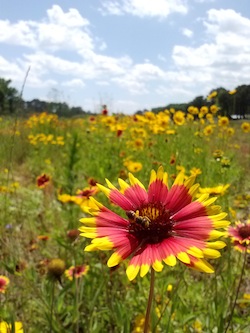SEJournal Online is the digital news magazine of the Society of Environmental Journalists. Learn more about SEJournal Online, including submission, subscription and advertising information.
Reporter’s Toolbox: Getting Started on the Sustainable Ag Beat
By Marie Orttenburger
How we produce the world’s food may be deeply entwined with the environment, but many modern agricultural practices are environmentally unfriendly, working to the detriment of animal species, soil health and watersheds.
Food production is inefficient as well — as UC-Davis plant scientist Lynn Epstein noted recently, the amount of energy we put into making food is much greater than the nutritional value we get out of it.
 |
| A wildflower field and pollinator habitat supported by a Sustainable Agriculture Research and Education grant at Dirt Works Incubator Farm, on John’s Island, in Charleston, S.C. Photo by Nikki Seibert, Lowcountry Local First, courtesy U.S. Department of Agriculture, Flicker Creative Commons. |
But experts like Epstein see a growing movement towards agriculture that integrates environmental health, economic profitability and economic and social equity. At the same time, they say, research on sustainable agriculture is booming, and there are examples of its implementation across the country. (Hear more from experts, including Epstein, who spoke on sustainable agriculture at the SEJ’s 26th annual conference in Sacramento last September).
All this makes sustainable agriculture a topic ripe to be reported on. This Reporter’s Toolbox offers some resources to help get you started.
Who’s doing research?
- UC Davis: Widely recognized as a global leader for its contributions to agricultural science, UC Davis’ Agricultural Sustainability Institute is a hub for relevant research, and its website is fertile ground for story ideas. The subprograms are worth a look, too. The UC Sustainable Agriculture Research and Education Program and the Russell Ranch Sustainable Agriculture Facility websites each have detailed write-ups of their research projects and contacts you can reach out to.
- UC Santa Cruz: UC Santa Cruz’s Center for Agroecology and Sustainable Food Systems is another institution known for its sustainable agriculture research. The website’s research section has background information on past and current projects, complete with related papers and researchers, whose contact information you can find in its people search.
- It’s always a good idea to check out your local university’s efforts as well. Here in Grand Rapids, Mich., where I’m based, Grand Valley State University has its own Sustainable Agriculture Project. Studies and activities with a local bent make for great story fodder.
Finding local resources
- Sustainable Agriculture Research and Education: SARE is a government initiative that awards grants to producers who have a commitment to agricultural innovation. Its website is filled with tools to help you find projects happening in your area, and its database of projects is searchable by keyword and state. Each state has a webpage with the latest news and a PDF with a list of funded grants. Plus, the SARE website has a ton of educational tools in its Learning Center, where you can beef up your sustainable agriculture knowledge.
- Your county extension office: The National Pesticide Information Center website has a database of extension offices in every county in the country. Find yours to learn about local sustainable agriculture efforts and connect with sources.
Nonprofits working on sustainable ag
- Rodale Institute: Supports research and education on best practices for organic farming. Its website hosts details on its research about soil health, pest management, wastewater treatment and much more. Each research page is a portal to related projects, reports and publications, and invites you to “dig deeper” and read related blog posts on the website.
- Savory Institute: Researches sustainable livestock grazing. Its “Evidence” page hosts a wealth of research on holistic management techniques. And its information and sources could be great jumping-off points for stories.
- Remember to check out local nonprofits that also have the goal of advancing sustainable agriculture. Even ones that don’t necessarily focus on agriculture often host related events. Cambria, Calif.’s Greenspace, for instance, which focuses on land preservation, invited the organic farming nonprofit Rodale Institute’s CEO Timothy LaSalle to speak in 2015 to local ranchers interested in more sustainable methods.
Listening to public discussion
Nothing is more convenient than having story ideas delivered right to your inbox.
- Tufts University comfood email listserv focuses on food systems and is free to the public. Subscribe for the latest on community food projects and food security.
- SARE also has a Google Group for public discussion. SANET-MG hosts discussion and resources and is a place to pose questions to individuals engaged in the sustainable agriculture movement. Joining or even just observing are great ways to keep up on the sustainable agriculture beat.
Marie Orttenburger is an assistant editor and reporter for Great Lakes Echo, which operates out of the Knight Center for Environmental Journalism in East Lansing, Mich.
* From the weekly news magazine SEJournal Online, Vol. 2, No. 4. Content from each new issue of SEJournal Online is available to the public via the SEJournal Online main page. Subscribe to the e-newsletter here. And see past issues of the SEJournal archived here.














 Advertisement
Advertisement 



